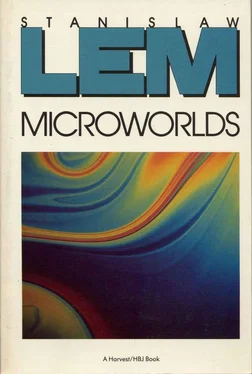In those years, I was particularly well informed about the latest developments in the various sciences, for the Krakovian circle functioned as a kind of clearinghouse for scientific literature from the United States (and, to some extent, from Canada) coming in to all the Polish universities. From the book parcels received I could borrow all the works that stirred my interest, including Wiener’s The Human Use of Human Beings. At night, I read everything voraciously, so that I could pass on the books as soon as possible to the people who were supposed to get them. On the basis of this reading, I wrote those of my novels that I can still acknowledge without shame — Eden (1959), Solaris (1961), The Invincible (1964), etc. They incorporate cognitive problems in fictions that do not oversimplify the world, as did my earliest, naïve science-fiction novels.
My father died in 1954, and toward the end of the fifties I was able to acquire for us — myself and my wife — a small house on the southern outskirts of Kraków, which we still have. (Close to this house, a larger house, in a larger garden, is in the process of being built for us as I write these words.) In the late sixties, I first made contact with my future literary agent and kindred spirit, Franz Rottensteiner, from Vienna. Both of us were then writing many critical, often polemical essays for Anglo-American science-fiction “fanzines” (i.e., the amateur magazines published by the aficionados of science fiction), mostly for Bruce Gillespie’s Australian Science Fiction Commentary; that resulted in a certain popularity for both of us, even if it was of a negative sort, in the science-fiction ghetto. Today, I am of the opinion that we wasted our efforts. In the beginning, it was totally incomprehensible to me why so many authors were erecting, viribus unitis, a common prison for science fiction. I believed that, according to the law of large numbers alone, there had to be among so many a considerable group at the top, as far as both writing abilities and scientific qualifications were concerned. (For me, the scientific ignorance of most American science-fiction writers was as inexplicable as the abominable literary quality of their output.) I was in error, but it took me a very long time to recognize it.
As a reader of science fiction, I expected something like what is called, in the evolutionary processes of nature, “speciation” — a new animal species generating a diverging, fanlike radiation of other new species. In my ignorance, I thought that the time of Verne, Wells, and Stapledon was the beginning, but not the beginning of the decline, of the sovereign individuality of the author. Each of these men created something not only radically new for their time but also quite different from what the others created. They all had enormous room for maneuvering in the field of speculation, because the field had only recently been opened up and was still empty of both writers and books. Each of them entered the no man’s land from a different direction and made some particular province of this terra incognita his own. Their successors, on the other hand, had to compromise more and more with the crowd. They were forced to become like ants in an ant hill, or industrious bees, each of which is indeed building a different cell in the honeycomb but whose cells are all similar. Such is the law of mass production. Thus, the distance between individual works of science fiction has not grown greater, as I erroneously expected, but has shrunk. The very thought that a Wells or a Stapledon could have written, alternately, visionary fantasies and typical mysteries strikes me as absurd. For the next generation of writers, however, this was something quite normal. Wells and Stapledon are comparable to the people who invented chess and draughts. They discovered new rules for games, and their successors have applied these rules with only smaller or larger variations. The sources of innovation have gradually become depleted; the thematic clusters have become fossilized. Hybrids have arisen (science fantasy), and the patterns and schemata of the literary form have been applied in a mechanical and ready-made way.
To create something radically new, it was necessary to advance into another field of possibilities. I believe that in the first period of my career I wrote purely secondary things. In the second period (Solaris, The Invincible), I reached the borders of a field that was already nearly completely mapped. In the third period — when I wrote, for example, reviews of nonexistent books and forewords to works that, as I put it, ironically, in an interview, would be published “sometime in the future but that do not exist yet” — I left the fields already exploited and broke new ground. This idea is best explained by a specific example. A few years ago, I wrote a small book entitled Provocation. It is a review of a fictitious two-volume tome ascribed to a nonexistent German historian and anthropologist, whom I call Aspernicus. The first volume is titled Die Endlösung als Erlösung (The Final Solution Considered as Redemption), the second Fremdkörper Tod (Foreign Body Death). The whole thing is a unique historico-philosophical hypothesis about the as yet unrecognized roots of the Holocaust, and the role that death, especially mass death, has played in the cultures of all times up to the present day. The literary quality of my fictitious criticism (which is rather long, or it wouldn’t have filled even a small book) is beside the point here. What counts is the fact that there were professional historians who took my fancy for the review of a real book, as is attested to by attempts on the part of some of them to get hold of the book. To my mind, Provocation, too, is a kind of science fiction; I am trying not to limit the meaning of the name of this category of writing but, rather, to expand it.
Nothing I’ve ever written was planned in an abstract form right from the start, to be embodied later in literary form. Nor can I claim that it was my intention to find other fields for development — that I set out with the intention of seeking them out for my imagination. But I can say something about the conception of an idea, the gravid state, the pains of giving birth, though I do not know the genetic make-up of the embryo or know how it is transformed into a phenotype — the finished work. Here, in the realm of the “embryogenesis” of my writing, considerable differences have developed in the course of some thirty-six years.
My earliest novels (which I acknowledge as my own only with some discomfort) I planned and constructed according to a complete design. I wrote the novels in the Solaris group in a similar manner, which I myself cannot explain. The terminology of birth that I have used above may sound inappropriate, but it is somewhat apt. I am still able to point to passages in Solaris and Return from the Stars where I found myself, during the writing process, in the position of a reader. When Kelvin, the narrator of Solaris, arrives at the station hovering over the planet Solaris and finds it empty of human beings, and when he starts his search for the crew, and encounters the scientist Snow, who goes into a state of panic when he sees Kelvin, I had no idea why nobody had expected his arrival or why Snow behaved in this peculiar manner; indeed, I had no idea at all that some “living ocean” would cover the whole planet. All this was divulged to me in the same manner that it becomes dear to the reader in the course of reading the book -with the sole difference that it was I who created the novel. And in Return from the Stars I faced a wall when the returning astronaut frightens one of the first women he meets, and then the word “betrization” is used: that’s the treatment that human beings have undergone in the future world to rid them of their aggressive impulses. I didn’t know at first exactly what the word should mean, but I knew that there must be some unbridgeable difference between the civilization that the man left when he flew to the stars and the one that he found upon his return. The metaphor that takes its terms from the lexicon of embryology is thus not nonsense, for a woman who is with child knows that she carries an embryo, but she has no idea how the embryo is transformed from an ovum into a child. Considering myself to be a rationalist, I dislike such confessions, and I should prefer to be able to say that I knew everything I was doing — or, at least, a good deal of it — beforehand, and that I planned and designed it, but amicus Plato, sed magis amica veritas.
Читать дальше












